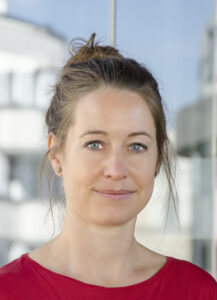
PD Dr. Gesa Hartwigsen · GSH
Max Planck Institute for Human Cognitive and Brain Sciences · Leipzig, Germany
Biography
I am a Cognitive Neuroscientist and Neuropsychologist interested in adaptive systems plasticity in neural networks for cognition. I completed my PhD in Hartwig Siebner’s research group at Kiel University in 2010. My PhD project focused on the role of the right hemisphere in language processing. To this end, I developed multifocal neurostimulation approaches to probe the functional relevance of right-hemispheric brain regions for language comprehension.
In 2010, I joined Dorothee Saur’s Language and Aphasia Laboratory at Leipzig University. During my postdoc, I combined neurostimulation approaches with neuroimaging to study short-term reorganization in the healthy and lesioned language network. From 2011-2013, I was supported by the DFG to study fronto-parietal interactions in the language network. I was appointed as Assistant Professor (Junior Professor) for Biological Psychology at Kiel University in 2013
In 2015, I was appointed as Research Group Leader at the Department of Neuropsychology, MPI CBS, and then I started my independent Lise Meitner Research Group Cognition and Plasticity at the MPI CBS in 2019.
Education and positions held
- 2019-present
- Lise Meitner Research Group Leader, Cognition and Plasticity, MPI CBS Leipzig
- 2015-2018
- Research Group Leader, Modulation of Language Networks, Department of Neuropsychology, MPI CBS
- 2013-2015
- Junior Professor for Biological Psychology, Kiel University
- 2011-2013
- Principle Investigator, Department of Neurology, Leipzig University
- 2010-2011
- Postdoc, Department of Neurology, Leipzig University
- 2007-2010
- PhD Student, Department of Neurology, Kiel University
Research Summary
The central aim of my research group is to identify generic principles of adaptive plasticity in the neural networks underlying higher cognitive functions across the adult lifespan.
We aim at elucidating the role of neural plasticity during the acquisition of novel cognitive skills, and also as an adaptive mechanism for cognitive challenges, counteracting cognitive decline, or compensating for functional loss after brain lesions. To this end, we use a multi-method approach, combining non-invasive brain stimulation (TMS, tDCS, tACS) with neuroimaging and EEG.
Our key hypothesis is that neural networks underlying cognition can rapidly change the functional weight of the relative contribution of different nodes, enabling flexible compensation after disruption. For instance, after focal perturbation of a key neural region for language, recruitment of other areas within the same network, or regions from a different network, may help to maintain language processing. A better understanding of these processes will pave the way for future enhancement of plasticity and recovery after brain injury, such as stroke.
Key publications
- Hartwigsen G., Stockert A., Charpentier L., Wawrzyniak M., Klingbeil J., Wrede K., Obrig H. & Saur D. (2020). Short-term modulation of the lesioned language network. eLife 2020;9:e54277.
- Hartwigsen G. (2018). Flexible redistribution in cognitive networks. Trends Cogn Sci 22 (8), 687-698.
- Hartwigsen G., Bzdok D., Klein M., Wawrzyniak M., Stockert A., Wrede K., Classen J. & Saur D. (2017). Rapid short-term reorganization in the language network. eLife 2017;10.7554/eLife.25964.
- Hartwigsen G., Saur D., Price C.J., Ulmer S., Baumgaertner A. & Siebner H.R. (2013). Perturbation of left posterior inferior frontal gyrus triggers adaptive plasticity in the right homologue during speech production. Proc Natl Acad Sci U S A 110(41), 16402-16407.
- Rumpf J-J., May L., Fricke C., Classen J. & Hartwigsen G. (2020). Interleaving motor sequence training with high-frequency rTMS facilitates consolidation. Cereb Cortex 30(3), 1030-1039.
